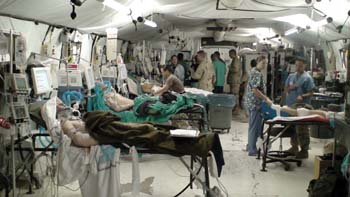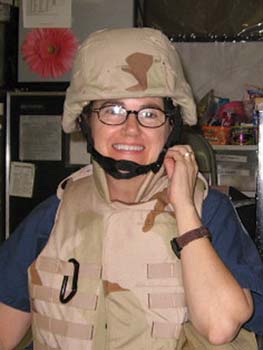
January 12, 2007: “Well, it is 3:30 a.m. here. This is my night off. I am working twelve-hour shifts on nights – three days on, one day off … It has been really tough to get good rest since I left home … Klent and I didn’t get to spend any time together as we had planned. So, I was in Balad as of the fourth. I started working on the fifth. I had two shifts of orientation and am now on my own.”
This is no ordinary journal, but Kate (Watts) Harkness ’79/98/01 isn’t leading an ordinary life. One doesn’t expect the ordinary at “Mortaritaville,” the nickname given to the 15-square-mile U.S. military base at Camp Anaconda because of the number of mortar and rocket attacks it has endured. Located near Balad, Iraq – approximately 40 miles north of Baghdad – it’s a place where anything can happen, and frequently does.
Harkness is used to handling myriad roles. After all, she is a member of Wichita State’s nursing faculty, a family nurse practitioner and a captain in the Kansas Air National Guard. She belongs to the 184th Medical Group from McConnell Air Force Base, a unit that is in its deployment cycle.
Harkness volunteered to deploy for the 120-day rotation, and she asked to work at Camp Anaconda’s combat support hospital. “This is tough duty,” her journal entry continues. “Horrific wounds do not discriminate between Americans and Iraqis. For some sick reason, snipers like to shoot children. You don’t hear about these facts at home.”
The hospital is comprised of tents, and it can handle about 100 patients in traumatic situations, such as a mass casualty. More typically, there are around 50 patients at one time. There are three intensive care units and four immediate care wards, through which Harkness rotates.
The survival rate for Americans is about 97 percent, and for Iraqis a little less. The personal battle toward recovery doesn’t end if Iraqis survive their injuries at Camp Anaconda. Their ethnic backgrounds – Sunni, Kurd or Shi’ite – determine where they will be placed for follow-up care.
“There are two facilities for follow-up, plus a teaching hospital in Tikrit. A Sunni cannot go to a Shi’ite hospital, and vice-versa, because they will be killed. The same applies to the Kurds. Very bizarre,” Harkness writes.
Catch-22
That dichotomy – being killed in a care facility – isn’t the only one Harkness faces. At Camp Anaconda, they are all around her. For example, the camp boasts certain amenities: movie theaters, fast-food courts and even an Olympic-sized swimming pool. Basic human needs and functions are another story, as she soon learns. If she wants to take advantage of fully-functioning toilet facilities, known as “Cadillacs,” it takes her exactly 281 steps from her trailer (known as “hootches”) to reach one. A Porta-Potty is only 32 steps away. “Trips to the bathroom must be carefully timed!” she notes.

Further exploration of the base reveals some pleasant surprises. Harkness discovers shopping opportunities, and she finds everything from a jewelry shop to Turkish and Iraqi bazaars. At the Iraqi bazaar, bootleg copies of nearly every TV show or movie are for sale, although not at a set price. “Haggling is accepted,” she writes. “It also helps pass the time.”
By February Harkness and her staff have discovered the power of innovation. “The nursing care at Balad is challenging to say the least,” she writes. “We do not have all the nice equipment we are accustomed to back home. We do not have the IVAC pumps or IV poles, plus we run out of bedpans, urinals, clothing and linen, and we must make do with what we have on hand.”
An empty one-liter sterile water bottle becomes a measuring device. When a Kurdish patient suffering from ICU psychosis becomes volatile and detaches his colostomy bag, she and her staff find a solution: They manage to reattach the bag using duct tape, without attaching the tape to the patient’s skin. Despite a real sense of accomplishment, nothing can totally distract her from thoughts of home.
“Besides my beloved husband and family,” she writes, “I miss Cheerios, real silverware, a covered coffee cup, bananas, any lettuce other than iceberg, spinach, wearing civilian clothes, rose-scented lotion, good beer, a great Shiraz and a pink flamingo on the stoop.”
The Little Princess
Habbaniyah is a small town about 50 miles west of Baghdad. On Feb. 24 a suicide truck bomb orchestrated by al-Qaeda targeted a Sunni mosque. The death toll rose to 56. Many of the children injured in the blast were cared for at Camp Anaconda, including one little girl who lost part of her leg – and captured the hearts of her caretakers. “We named her ‘Princess Nala’ because no one knew who she was,” Harkness writes in her journal.
Civilian liaison officers searched for Nala’s family for weeks. Eventually her mother was located, and the hospital staff learned her real name: Teeba. Bundled in blankets, Teeba was flown by helicopter to be reunited with her mother. As she was leaving Camp Anaconda, she cried, arms outstretched, while being carried down the hallway. “That all sounds short and sweet,” Harkness writes. “But it was one of the hardest experiences to date for many of us to go through because she touched our hearts so deeply.”
Coming Home
In April it is spring in Iraq as well, which means that on most days the temperature is over 100 degrees. The next deployment will have to deal with temperatures that can reach 140 degrees. Harkness is sympathetic, but looking forward to being home. “The other day we were awarded our Iraqi Campaign Medal and the Expeditionary Ribbon,” she writes. “I can honestly say all of us earned them.”
She is home on May 19 – just one day late due to a sandstorm outside of Qatar. Her husband of 15 years, Klent, is overjoyed. They met in the Navy Reserve, but, he says, “I never thought I’d be the one left behind. At first, she tried to call every night, but depending on what they were up against, that didn’t work out well. I’d try to be home by seven every night, and we’d instant-message, but sometimes I wouldn’t hear from her for three or four nights in a row.” His voice becomes quieter and more serious. “That put me on edge more than anything.”
Harkness is readjusting to civilian life and enjoying simple pleasures she once took for granted. When she looks back on her tour of duty, one memory stands out. While its roots reach back to Iraq, the instance she recalls happened on her way back to Wichita, in the Baltimore Airport: “I heard someone say, ‘Ma’am! ’ An Air Force captain approached me and said, ‘Do you remember me? You took care of me when I was wounded.’ I didn’t remember him, but that was nice.”
Harkness praises the U.S. medical and nursing staff in Iraq and adds, “I provided services, treatment and care to the best of my ability. I did make a difference. And I can say that without being boastful.”





